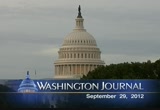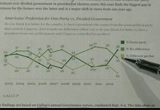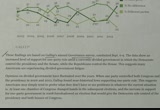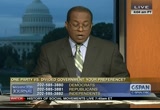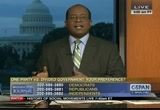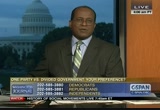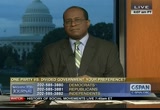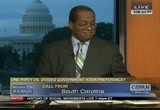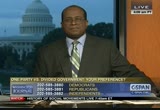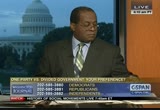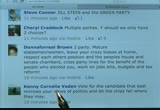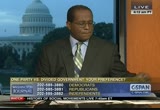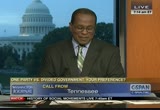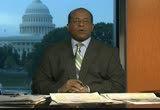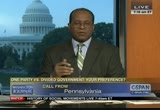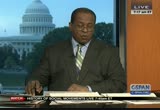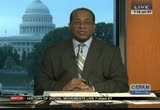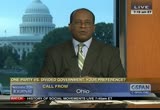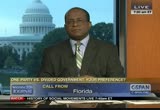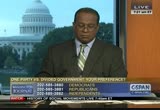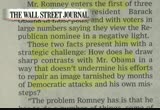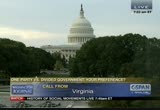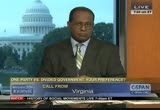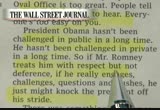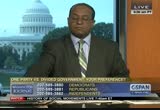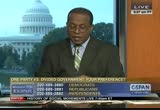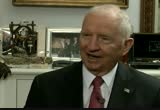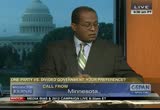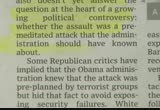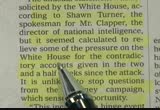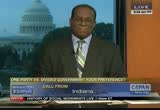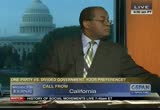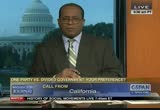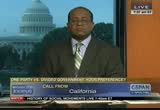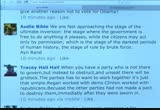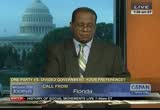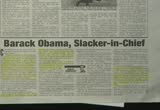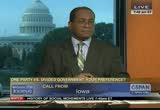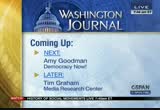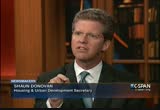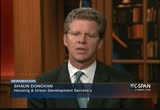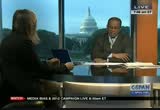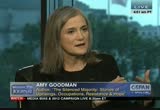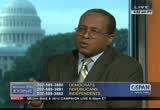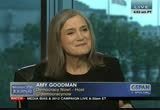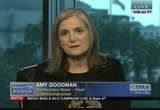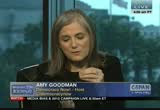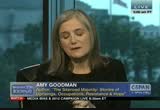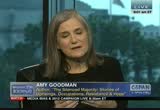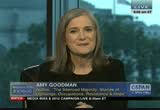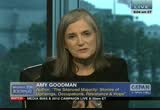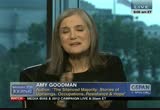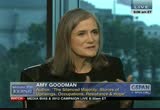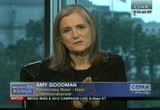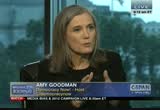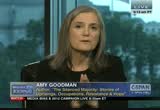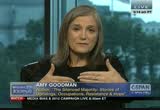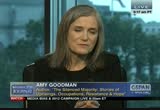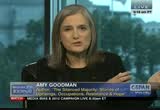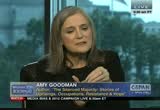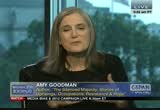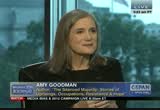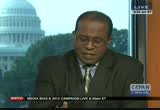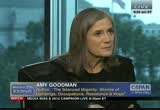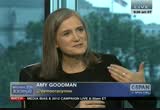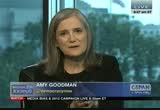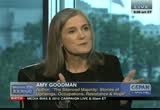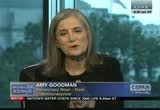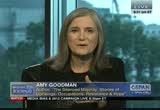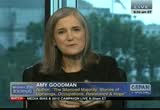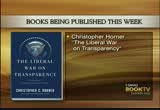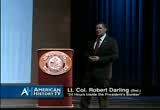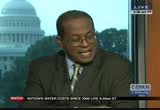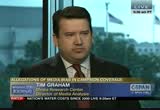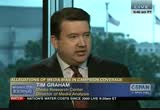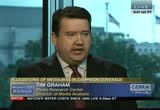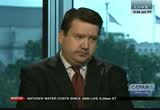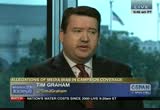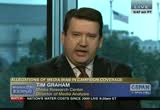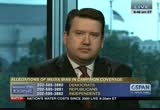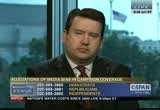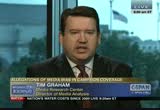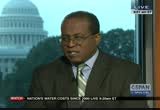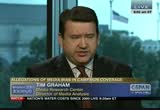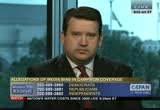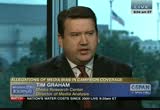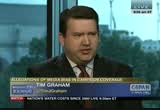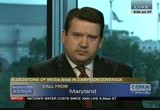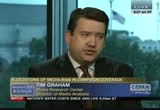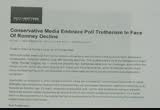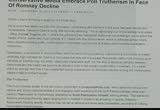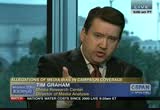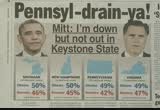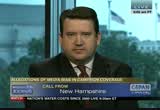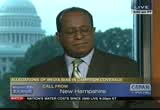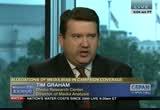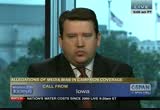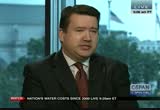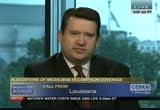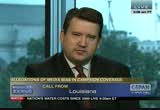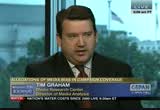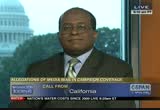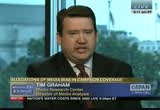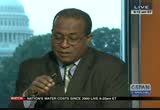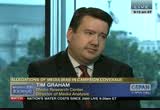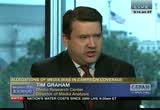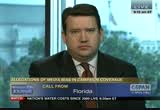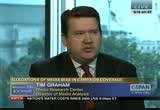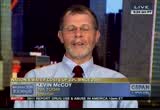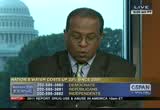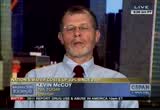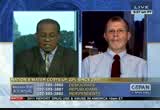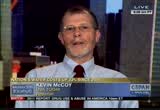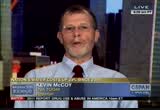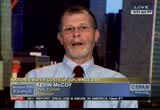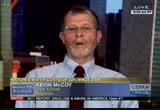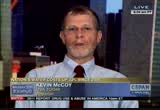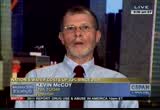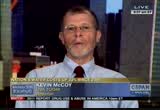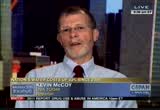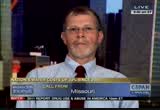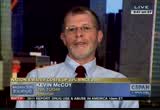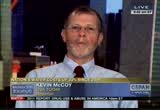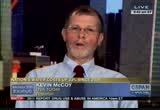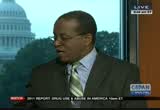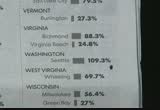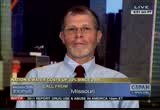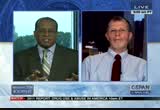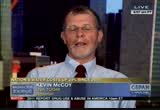tv Washington Journal CSPAN September 29, 2012 7:00am-10:00am EDT
7:00 am
8:00 p.m. on c-span's "q & a ." this morning, a talk about social movements. and then why media bias has reached unprecedented levels in this election cycles. and later, usa today reporter discusses why the nation's water costs have risen 32% since 2000. "washington journal" is next. host: as we look at the capitol, record high 38% of americans prefer that the same party control the presidency and congress, while a record low, 23%, say it would be better if the president and congress were from different parties. 33% say it doesn't make any difference to them.
7:01 am
these findings are based on a gallup poll annual governance survey and are the basis for our discussion for the first 45 minutes of this edition of the "washington journal." good morning. today is saturday, september 29. we want to find out from you about divided government. are you in favor of it? would you prefer to see one party, two parties, three parties? one party versus divided government, your preferences is our topic for the first segment of the program. 202-585-3880 is our number for democrats. republicans can call us at 202-585-3881. independents, 202-585-3882. if you're calling outside the u.s., 202-585-3883. we'll show you those numbers throughout the segment. if you want to get in touch with us via social media, the address, twitter, twithtwith cspanwj.
7:02 am
on facebook, it's facebook.com/cspan. if you want to send us an email, that address is journal @organize org. -- is journal @c-span.org. this is the gallup poll we're talking about. it's the gallup annual governance survey. they write while americans tend to lean toward one-party government over divided government in presidential election years, this year finds the biggest gap in preferences for the former over the latter and is a major shift in views from one year ago. if you take a look at the graph that they have here, dark green are the folks that favor same party at both ends of pennsylvania avenue. the medium green, no different. the light green, different parties. so, for this year, in an election year, 38%, as we mentioned, say that they would prefer the same party control the presidency and congress, while 33% say it doesn't make a
7:03 am
difference to them. 23% say that they'd like to see different parties at different ends of the block here. as we mentioned, these are findings based on gallup's annual governance survey conducted earlier this month. the data show an increased level of support for one party rule amid a currently divided government in which the democrats control the presidency and the senate, while the republicans control the house. this suggests americans are experiencing divided government fatigue. opinions on divided government have fluctuated over the years, when one party controls both congress and the presidency in 2006 and 2010. gallup found near historical lows supporting one party rule. this suggests americans may simply tend to prefer what they don't have or see problems in whatever the current situation is. at least one chamber of congress changed hands in the subsequent elections, and the
7:04 am
increase in support for one-party government in 2008 foreshadowed an election that would give the democrats sole control of the presidency and both houses of congress. we're talking about one party versus divided government. we want to find out your preferences. the numbers again, democrats, 202-585-3880. republicans, 202-585-3881. independents, 202-585-3882. and you can reach us via social media. again, the addresses there, twitter, @cspanwj. facebook, facebook facebook.com/cspan. our email address is journal @c-span.org. more regarding the poll conducted, got up's survey, rather. they say just once in 2005 have
7:05 am
a plurality of americans preferred divided government since gallup began asking this question, indicating division at the federal level is rarely possible. the "makes no difference" response has generally been the most popular, though support for it fell this year to tie the lowest level gallup has found. they go on to say that the democrats, 49% are now more likely than republicans, 36%, or independents, 28% to favor one-party government. there may be several reasons for this. democrats currently control the presidency, and many democrats may be frustrated that president barack obama cannot enact his legislative agenda without the help of a sympathetic congress. we're going to get back to more of that. but first, randy is on our line for republicans. randy, where you calling from this morning? >> chapel hill, north carolina. host: all right.
7:06 am
so, are you one party, divided government? how do you come down on this one? caller: well, i just always wanted to say keep the system in congress the way it is. but here's the deal, and i'll be quick. i have two separate caucuses control their own taxes. republicans, their caucus would control all the taxes that republicans pay, and we republicans could pay for all the b.t. bombers and the infrastructure, all the things that we want, and the democrats can take all of their taxes they collect and pay for the social programs. and then, in the middle, all the sings that we both absolutely agree on, we just cut it in half and pay for that and then that way the things that each other don't like, both sides, we'd be able to pay for their own things that they want. host: that is a very interesting way of looking at taxation, randy. we're going to continue our
7:07 am
conversation about one party versus divided government with paul. paul is calling from wisconsin. he's on our line for democrats. go ahead, paul. caller: hey. yeah, i definitely believe in a one-party system. i think if barack obama would have been able to get his policies throughout, his unemployment rate would probably be about 7% with all them jobs programs. you know, the republicans were trying to do everything they can to stall the economy so they can get back in power. but i seen a graph, and it showed that when the rich pay higher taxes, the economy grows faster. host: paul, there are a lot of republicans that will say in the first two years of the obama administration, there was democratic control of both houses of congress, and the president had a hard time getting his legislative agenda passed. caller: it's because the filibuster in the senate, i mean, when you need 60 votes
7:08 am
and the democrats only had 59, so he had a hard time getting even healthcare through. host: all right, paul, we're going to move to andy on our line from independents, calling from florida. caller: sorry, i'm calling from south carolina. host: ok, andy is calling from south carolina where. in south carolina, andy? caller: columbia. host: ok. are you in favor of divided government or one party? caller: well, i'm not so sure i'm in favor of either one, unless -- except if divided government is going to give us what it's given us now and nothing gets done, nothing gets passed. we got a credit rating downgraded because one party says my way or the highway. that's not good governance. it's not -- there's no such thing as my way or the highway. we all have to compromise, you know, in a marriage, the husband doesn't get everything he wants, and neither does the
7:09 am
wife. and that's the way i look at it. we all have different views. what we should do is agree on the things that we should agree on that will serve the common good, like infrastructure, and going to disagree on certain things, and that's fine. but as far as this filibuster thing in the senate, which everyone says i don't understand where that law came from, i thought a majority is anything that's above 50%, and i don't know where this 60% came from. maybe you could enlighten us on exactly the origin of that filibuster law. host: well, andy, that would take way too long for me to explain, but perhaps we'll do that as a segment on the "washington journal" and take our viewers and listeners through the intricacies of the rules of the house and senate. but thanks for your call. we're going to move on to ron on our line for democrats, calling from florida. good morning, ron. caller: good morning. host: ron, divided party -- one party or divided government? caller: well, that question is
7:10 am
-- the underlying point is you're saying a -- in essence, what you're saying is a one-party state, and that just doesn't work. it was proved in the soviet union and the place where i immigrated from, which was cuba. the problem is, as someone said, this is not your father's republican party. when you have a new crop signing a pledge before they even take office that allows them no room to negotiate, on top of that, the two sides have hardened and polarized, there's no compromise. that is the true problem. host: and what about the compromise on the democrats' side? you don't think they're just as hardened against the republicans as the republicans are against the democrats? caller: well, with all due respect, both sides are hardened, but i don't see the democrats signing a pledge that
7:11 am
allows them no room for compromise with the grover nor quist pledge. if we're going to change economics out the window, in a position where there's a recession, or let's be frank, it was a depression what happened in 2008. if government's role to step in and stimulate and spend money, because nobody else is doing it. if you're going to discard with that notion, then, you know, anything goes. it's scary. host: all right. andy, we're going to leave it there. that's andy on our line for independents. we've got a couple of folks who chimed in on our facebook page. the address there, facebook.com/cspan. and sheryl writes, multiple parties, why should we only have two choices? donna says two party, mature statesmen and women, leave your crazy biases at home, respect
7:12 am
each other's position and the people's house and senate chambers, cross party lines for the benefit of people who elected you, work on jobs bills, budget, and tax reform. and kenny writes, vote for the candidate that best mirrors your views of politics and let the chips fall where they may. we're talking about one party versus divided government, your preference. our next call comes from ron on our line for democrats. ron, you're on the "washington journal." go ahead. don. go ahead, don. caller: good morning. this is dell. host: this is dell? caller: yes. host: ok, dell, where are you calling from? caller: bethlehem, pennsylvania. host: ok, dell from bethlehem, pennsylvania. what's your preference, one party or divided government? caller: one party, of course. countries that are advanced in the world like great britain and germany, it's not like they
7:13 am
elect a party and the party chooses their representative generally, and that way they get things done. this filibuster issue over here, it's way out of control. they did use the filibuster in the past year, but they were issues of national importance, not senate record and a year and a half of filibusters. that's just outrageous. any constitution that does say that the president shall break a tie when there's a tie in the senate, that's never going to happen, because republicans don't believe in the constitution. they only believe in it when they want to believe in it. those filibusters -- things of national importance, when you were dealing with people like hitler, you know? but they want to call our president a socialist. it's ridiculous. there's no socialism here. host: dell, we're going to leave it there. thanks for your call. we got a tweet from david julian roth, who writes our current ideological divide
7:14 am
seems parliamentary, but without one-party accountability. again, our twitter address, @cspanwj. next up is don, calling from tennessee on our line for independents. good morning, don. you're on the "washington journal." caller: good morning. thank you for this opportunity again. political parties just won't work for obvious reasons. i agree with the fellow that called in. was he from cuba? host: give me one of those obvious reasons. caller: well, it's all or nothing with them. i bring up the case of obama. when you had democrats ruling and everything they couldn't get everything done, two-party, i don't know. north versus the south didn't work real good for us 150 years ago, but why not have it set up eastern and central and pacific? three parties divided like the time zone. host: by the time zones, all right. don in tennessee on our line
7:15 am
for independents. caller: thank you. host: more from the report from the gallup survey. they write that democrats are more likely than republicans to express faith in the federal government's ability to handle domestic problems, insofar as politically unified executive branches ease the passage of laws and the implementation of policies designed to solve national problems, democrats would view this as a positive development. republicans also fare one-party control over divided government, but by a smaller margin of 36% to 27%. independents are split in their preferences between one-party, 28%, and divided government, 30%. democrats' preference for united government rose significantly this year to 49%, compared with 35% last year. independents also became more favorable to a one-party government this year, up seven percentage points compared with 2011. republicans did not see a significant change. we are talking about one-party
7:16 am
government, versus a divided government, want to find out your preference. our next call comes from theresa on our line for democrats, calling from pennsylvania. theresa, you there? caller: yes, hello. thank you for taking my call and thank you for c-span. i love this show. host: well, we love having you call in. one party or divided government, what's your preference? caller: i would prefer divided government, but i think that when legislators are sworn in, they should be sworn in to legislate on the part of the american people and their constituency, not a misnomer like grover norquist. if we had that go on, we may not hit all these obstructionists. host: you know, i can't do the oath of office verbatim, but the president and the congress,
7:17 am
don't they swear to uphold the constitution? caller: well, they do, but then they're signing something outside of that. and they're being held accountable to some guy as opposed to the people that put them in office. and that messes up the balance. host: is it then the responsibility of the people who put that person in office to check them and maybe replace him with somebody else? caller: most definitely. i think that if they're not held accountable, they should be working for the people that put them in office. they hired them, not somebody else, a lobbyist. host: thanks for the call, theresa, on our line for democrats, calling from pennsylvania. we're going to continue our discussion regarding one party versus divided government, your preference. as we do that, we're going to look at various stories in a couple of different newspapers this morning. this one is the op lead in this
7:18 am
morning's "washington post," "candidate priority cram for debates." both nominees will take a break from the campaign trail to focus on the looming face-off. president barack obama travels to henderson, nevada, on sunday for a mission far more important than the usual swing state campaign rally. he will huddle private well senior aides for an intensive three-day boot camp to prepare for the first presidential debate. host: we're going to have complete coverage of those debatesful you'll be able to see those on c-span.
7:19 am
you'll be able to listen to them on c-span radio and also follow them online at c-span.org. back to the phones. rob calling from ohio on our line for republicans. are you there, rob? caller: yeah, i'm here. host: rob, one party or divided government? caller: well, i say both can work. with one party, you've got to be able -- any time you pass big bills, you have to bring in some of the other parties. preferably about four or five. i think any bill you pass, you can get that many. if they don't reach over to the other side and get at least five to six, then they're running ramshod over everything. now, with two parties, they still have to work together and bring people in. host: what would you say, if things don't change after the november election and we still have a democrat in the white
7:20 am
house, democrats running the senate, and the republicans running the house, how would you advise them to come together to try to get something for the american people? caller: well, you know, we've had that before, like when we had gingrich. he reached across the aisle to the other ones. you know, they got to be in between. i believe the republicans got a bad taste, and by not working with them, the democrats ran ramshod. hopefully after this, they have to get together and do a lot of big changes. host: all right. rob, we're going to let you go. our next call will be coming from john on our line for independents, calling from florida this morning. go ahead, john. >> good morning. i just wanted to, first of all, i believe in check and balances in the constitution, and the united states says we should have. i don't want one party running
7:21 am
anything. the bottom line is people -- i think 80% of the people in the united states don't even know the constitution, and for limited government, not as a progressive, which, by the way, is what obama is, a progressive, just like hillary clinton, who admitted she was. host: let's not go too far off the rails here. i understand that the constitution, the check and balances that the constitution refers to is between the legislative, the judicial, and the executive branch, and doesn't really mention the establishment of a two-party system. caller: you need a two-party system. look what happened the first two years -- even though it took obama two years to get the healthcare through, they still had everything right there. unless you have a complete representative, you know, in there that represents everyone and just not one side, like all progressives or all republicans, you don't have those checks and balances, whether it's the legislative, judicial, presidency, whatever.
7:22 am
you need -- the bottom line -- you know, there's one problem on this whole thing. obama is not a politician. i mean, he cannot negotiate. reagan was in there. he had a democrat in congress, and he was able to negotiate like several people. obama can't do that. he goes out there and says, hey, this is my bill. he doesn't know how to negotiate. host: thanks for calling. in "the wall street journal" this morning, making a difference is their headline. romney campaign seeks to portray tough and nice image. obama team aims to avoid a gaffe. they write --
7:23 am
host: back to the phones. linda on our line for democrats, calling from florida this morning. go ahead, linda. caller: i believe in a one-party system. i think that one of the problems we've got is they had 380-something filibusters. let them filibuster, but let them bring their counts when they do. that's the big problem with the filibuster today. as far as obama being too nice, you're a very nice person, and thank you for handling c-span. host: well, thank you very much, linda. but i am not the president of the united states, so we're going to move on to curtis on our line for republicans, calling from virginia this morning. go ahead, curtis. caller: yeah, i believe in one-party control in congress if it's a republican. if it's not, i don't want to
7:24 am
see the democrats in control. i think they got way too extreme and the reason they don't compromise as much -- i feel it's all the democrats' fault. host: let me refer you to a tweet that we have from gary. gary says divided government is best. however, not dysfunctional government. we need people who do government can do things and allow it to do those things. what do you think? caller: honestly, i think divided government is it good, and i do like the fact that there's -- for example, you've got obama, he wants to put forth a socialist agenda. i don't want a socialist agenda. they keep saying we're obstructing. you're darn right we're obstructing. we don't 79 a socialist agenda in united states. that's been tried in europe, and look how bad off they are. it's just a disaster. i don't mind when they call us obstructionists, and i'm proud we're obstructing. i hope we take over all three
7:25 am
branches of government. i hope we take over the executive and the legislative in november. host: that's curtis in virginia on our line for republicans. in "the wall street journal," one more item regarding the debates. this is an op-ed from peggy noonan this morning. the debates, this is it, mitt, she writes.
7:26 am
host: back to the phones. juan is where we get our next call from. juan is calling from california this morning on our line for independents. go ahead, juan. caller: good morning. i just wanted to let curtis know that i think he's -- i don't know, i think he's a bit of a tyrant the way he talks. but anyway, i'm for a one-party government, as well as it's not the g.o.p. the grand obstructionist party. it's because of them that we've really failed in our only stration as a nation to go forward in a time of need. i'm just here to support the country in moving forward for a new year. thank you. host: freddy on our line for democrats. go ahead. caller: thank you. i believe in a two-party system, but it all began when the president was inaugurated.
7:27 am
pardon me? host: no, go ahead. caller: it begins when this president had the inauguration. they met up and was meeting, the number one priority to make this event a one-time president. how can you communicate with somebody when you know they're against you from the beginning? they said they was going to obstruct everything this president do. the filibuster, everything this president do, they call him names and say everything about him. that's why they say, hey, thank you. host: that's freddy in north carolina on our line for democrats. we want to let our viewers and listeners know that we're going to have part of a ross perot interview on our programming on c-span on monday.
7:28 am
he was interviewed by "usa today's" richard wolfe, and they talked about the economy, the deficit, and the debt, and how it's changed since mr. perot ran for president in 1992 and 1996. this will be monday night on c-span and c-span radio at 9:00 p.m. eastern time, and you'll be able to find richard wolfe's article in the "usa today" on monday and usatoday.com. this is a little bit of what mr. perot had to say in his interview with richard wolfe of "usa today." >> if i told you i don't want to dig out of my debt problem until i go broke, you'd say, what are talking about? that's what you just said. but in very polished terms, recession. you're not going to pay your debt if you don't have the money. and if things are going downhill and you're running your debt up, you make it next to impossible to pay your debt, and we've got to put the brakes
7:29 am
on now and do this now and start to get it done. it can be done if we in the house and senate and white house have the will, and certainly they should have the full support of the american people to get it done. host: we're talking about one-party versus divided government for about the next 15 minutes of the "washington journal." our next call is from pat on our line for republicans. she's calling from new jersey. caller: hey, robb. i think divided government is best, because for the last 60 or 70 years, one-party government has usually coincided with a massive growth in the federal government. in the past -- most of our history, we had one-party rule. the same party won the presidency and the congress. but for most of that time, the government was much smaller. since we've had one-party rule, we got nafta. even when the republicans took over under george bush, we had
7:30 am
huge government spending. it seems like when one of the parties takes over, part or all of one branch begat more cooperation, and it works out better. host: with your version of the divided government, who also at the top of the food chain? who's in the white house? republican or democrat? >> i'm willing to have a democrat. i think the republicans are better at congress and they think they're better to control spending, but i think you need a democrat, someone like bill clinton who can work with both parties. and that's not what we're getting right now. host: thank you very much, pat. our next call comes from david from minnesota on our line for independents. caller: yes, i think the ones that are at the top of the food chain are the lobbyists and the people that are buying our government out from underneath us, and i think we should have term limits and get rid of some of the people that have been in there for 100 years.
7:31 am
and i think right now we've got the best government money can buy, and it's been bought by the lobbyists and the big corporations. there's also a saying, congress fiddled while the u.s. burned. and there's only 10% approval of congress right now. and these guys get too cozy with the lobbyists and the public should break up the logjam by voting all these old-timers out and getting rid of them. as far as the one-party system, hitler had a one-party system with the nazi party, and stalin had it with the communist party. i don't think that works out very well either. host: all right, david from minnesota, we're going to leave it there. more from the newspapers this morning, a couple of different looks at the aftermath of the attack on the u.s. consulate in benghazi, libya. libya attack was organized, u.s. says. this is in this morning's "wall street journal."
7:33 am
7:34 am
host: back to the zpones our discussion regarding one party versus divided government. our next call is from anton in indiana on our line for democrats. anton, you're on the "washington journal." caller: well, thank you for taking my call. i enjoy your show. i watch you every weekend. host: well, i appreciate you watching. now, your thoughts on one party or a divided government, which are you in favor of? caller: well, i believe in divided government, but i don't believe in obstruction of the process. and i would like to remind all of your viewers about the grover norquist pledge that all of the republicans seemed to sign, and it kind of backs them in a corner not to compromise with the democrats.
7:35 am
i would also like to remind everyone that mitt romney has also signed this pledge to grover norquist. can you imagine that? the president of the united states signing a pledge with a lobbyist? it doesn't make sense. that's my comment. host: our next call is bob on our line for independents. good morning, bob. came yeah, i live in sacramento, california, and we have undivided government here for a long time, except for when schwarzenegger tried to come in, and the results were disastrous. of course, the unions and democrats and so forth did anything they could to get them in line. if you want to see an undivided government for a long period of time with lots of new regulations and businesses leaving, like campbell's soup is leaving, closing down here
7:36 am
in sacramento, california. comcast is closing their call center here, just in the paper yesterday. and another one i can't think of. but you're going see what's going to happen. the tax-paying businesses will leave the state and move elsewhere, and i don't know how they're going to get by. i'm 78 years old. if i was a little younger, i'd pull out of this place, and i've been here all my life. in fact, i was in business here for a while. host: hey, bob -- caller: i do not want to see the undivided government with the liberals running it. it will be horrible. nothing against liberals, but my goodness, it's just terrible here in california. host: bob, while i got you on the line, i want to get your reaction to a story that's on the front page of the "los
7:37 am
angeles times" this morning, "voters wary of change to campaign financing." this is out of sacramento, where you live. host: bob, your thoughts? caller: my first thought is, without reading it, is i would probably be in favor of not allowing it to be done to the unions or anybody else. as a matter of fact, we do need campaign financing changes where people can run for office in some other manner, where
7:38 am
they don't raise millions and billions and so forth. it's just kind of craze any that area. host: bob, thanks for your call. that's bob in california on our line for republicans. a couple more messages on our facebook page. this one says, we are fast approaching the stage of the ultimate inversion, the stage where the government is free to do anything it pleases while the citizens may act only by permission, which is the stage of the darkest periods of human history, the stage of rule by brute force. and tracey says, when you have a party who is not there to govern but instead to obstruct and unseat, there will be gridlock. the parties have to want to work together. it's just that simple. reagan worked with democrats. clinton worked with republicans. because the other parties had
7:39 am
not made a pact to destroy them, immediately after they were sworn in. again, if you want to send us a message to our facebook page, the address there is facebook.com/cspan. next up, harry is on our line for independents from florida. go ahead, harry. caller: i think divided government is better, only for the democratic process. we need people from different views, to be able to come together and work things out. the reason i'm saying a democratic president is because when i was making my choice and
7:40 am
i looked back, looking at past presidents and its country, and i kind of feel that, you know, the legacy of the president and democrats work at better than the republicans want, because you can tell what bill clinton is doing around the world, what jimmy carter is doing with habitat for humanity. but i just kept can't remember exactly what he has or any other past republican president i've been doing for people, so i think although i would like to see divided government, but i would a democrat in the white house. host: all right. we've got an editorial, or op-ed, rather, from "the new york post" this morning, barack obama, slacker in chief. he writes --
7:42 am
host: you can read more of that in this morning's "new york post" at newyorkpost.com. pam is our next caller. she's on our democrats line, calling from iowa this morning. go ahead, pam. pam, are you there? caller: hello? host: hello. caller: hello. host: hello. caller: hello. host: pam, go ahead. caller: i believe in a two-party system. i believe that the biggest problem right now is priorities and the ability to shell things, and there should be some sort of implementation of appropriate priorities. that way they can't sit there and do, you know, we're going
7:43 am
to do abortion, we're going to do contraception. they can't just feed off all these little things and leave the big things. host: all right. that's pam on our line for democrats, calling from iowa this morning. in "the wall street journal," student loan defaults mount again. they write the number of americans who dwault on federal student loans edged up again in the most recent reporting period.
7:44 am
host: jeff on our line for republicans, calling from new york this morning. go ahead, jeff. caller: good morning. host: good morning. caller: this question of one or two parties is a misnomer. the fact of the matter is we've been living with a one-party system since woodrow wilson. we're the party of the federal reserve, doesn't matter which party you actually belong to, as long as the federal reserve controls the pursestrings. we need to correct that. otherwise the multiple voices out there, and the government has always been from multiple voices from the very beginning who want to individually speak of what's going on in the world. host: all right. caller: when you have money that basically controls voices, you lose your voice. host: all right, jeff, thank you very much for the call. jeff on our line for republicans, calling from new york this morning. want to tell you a little bit about what's coming up on this
7:45 am
edition of the "washington journal." next up is amy goodman. she'll be discussing her latest book, "the silent majority." then we'll hear from tim graham of media research center. he'll be here to talk to us about his group's claim that the liberal media bias in this election cycle has reached "unprecedented levels." we also want to let our viewers and listeners know that on "newsmakers quggets, housing and urban development secretary shawn donovan is our guest. he's going to talk about what else can be done to help families that are underwater on their mortgages, meaning that they owe more on their homes than they're worth. >> a year ago, when the president put forward his american jobs act in a speech to congress, he also said we're going to do more about refinancing. in fact, the very first thing did he in his we can't wait campaign was say we're going to take the actions that we can with our own powers to help more families refinance. and that's specifically for
7:46 am
families that have government-guaranteed mortgages. since we made those, we've seen refinance ago cross the country double, and more importantly, in the states hardest hit, in nevada, we've seen a more than tripling of the number of families that are refinancing. we expected maybe to reach a million homeowners. we're about to reach a million just in the first nine months of this year. that is real success, and it's made a big difference. here's the problem. we've got too many families either that don't have government-guaranteed loans, or that have loans that they're still locked out because the fees are too high for them to refinance, there isn't much competition, or there are other leans. they may be above water on the first lien, but they have credit card debt or college loans or a second lien stopping
7:47 am
them. that's why the president, in the state of the union address, laid out a comprehensive package that would help every family who's current on their mortgage be able to refinance. and it's why we've made it our top priority for when we come back in session after the election for the senate to pass those bills. there are three pieces of legislation, one sponsored by senators feinstein, another by mendez and boxer, and a third by bierk leave that we want to see pass when had the senate gets back in session. it's something we can do. it's had bipartisan support in the past. it's common sense. it saves money for families and the taxpayer. we ought to get these bills pass the -- bills passed right away. >> c-span is unbiased. they just tell you the news straight up. that's no ad. that's the biggest reason. i'm a firm believer that the c-span video archives are truly a gift to the american people t. is arguably one of the most historical -- i would say one
7:48 am
of the most historical archives there are. i primarily watch the "washington journal" and the house of representatives proceedings, and c-span2 for the u.s. senate. >> jake young watches c-span on c-span, created by america's cable companies in 1979, brought to you as a public service for your television provider. >> "washington journal" continues. host: amy goodman joins us here at the c-span desk. many of you know her as the host of "democracy now." she's also the author of a new book called "the silent majority: stories of uprisings, occupation, resistance, and hope." welcome to the program. guest: it's great to be with you. host: you are in the midst of a 100-city tour that you tell me is running through election day. where are you at this point in the tour, and how many more
7:49 am
cities do you have? guest: well, i think i'm at c-span right now, although it is a little confusing. last night i was at the university of virginia in charlingtsville. today we'll be at the washington convention center, the green fest tonight. baltimore book fest. tomorrow, richmond, virginia, at noon. and then in the evening i'll speak in norfolk. then on monday night, we'll be at virginia tech, which is very interesting, going back to the scene of the massacre. i'll be speaking there, you know, 32 people were killed there. and colin goddard is coming with us. he was one of those victims. he was shot four times. i'm also looking forward to interviewing a professor there. and then we're on to colorado for the big debate. we're going to be doing something interesting. we're both speaking on the silent majority election 2012 tour, but also we do this daily, radio and television broadcast that airs on over 1,100 stations, so we have to do the broadcast wherever we are. and being on the scene has been
7:50 am
remarkable. i'll give you one example. we, last week, were in freeport, illinois, and got a truck, and we went to the stevenson fairgrounds. it was right across the street from a plant which happened to be owned by bain capital. across the street, the workers, the employees of this plant who worked there like, oh, dot turner for 4 years and tom for 33 years, they are camping out because the plant is closing up shop there, and their plant is being moved to china. so here are all of these workers who are going to be out of work. and when they learn that the plant was owned by bain capital, which was co-founded by mitt romney, they thought, well, there's a human face there, maybe we can appeal to him to have our jobs saved so. they're calling on mitt romney
7:51 am
to come to freeport. they've named their encampment bain-port. they have all sorts of signs up , maybe mitt romney does have a jobs plan for china. they're saying, please come to our place. it's amazing to see this encampment. it's been going on for about two weeks now. we talked to the mayor of freeport, the community is supporting this encampment. and he said the mayor, his name is george, he said we would like both candidates to come here and have a debate. this is the site of the lincoln-douglas debate in 1858. why don't they come and here talk about what's happening to the jobs in this country? how can mitt romney talk about jobs in this country when his company, bain keep, which he founded and certainly has ties to and can influence today,
7:52 am
will send out more than 150 jobs to china right now, most of them will lose their jobs on november 5. they'll get on the unemployment line and vote at just about the same time. host: tell us about the title of your book, "the silent ma jort." who are these folks, and how are they silent? guest: well, i really do think that those who are deeply concerned about war, those who are concerned about the growing inequality in this country, people who are deeply concerned about climate change, the forest fires, the droughts, i mean, we're talking about dust bowl-era times now in this country, and not only in this country, but around the world, those who are concerned about the fate of the planet are not a fringe minority, not even a silent majority. but the silenced majority, silenced by the corporate media, which is why we have to take it back. host: but one could argue that with the explosion of social
7:53 am
media, with all the stuff that's being sent back and forth on twitter and facebook and emails and foursquare and all this other stuff, that there is no majority now that is silenced, that every voice has some sort of a platform where they can speak from. guest: well, there are ways to get information out, but i do think that the mainstream networks have a responsibility to bring out the views of people at the grass roots. when you watch the pundits on television, the small circle of pundits who know so little about so much, explaining the world to us and getting it so wrong, go to where the silence is, but let people speak for themselves. you know, we just passed the first anniversary of the occupy movement. it was september 17 when thousands streamed into the park in new york. i'm based in new york, i live there, and that's where we do "democracy now" usually, except
7:54 am
we're on a 100-city tour. but on september 17, the networks hardly covered occupy in the first days, in the first days. and then the days ticked by. i mean, this was the media capital of the world, new york. they are under their noses. but first they don't talk about them. then they start to ridicule them. what's their message? everything else has something to say, why don't they have a spokesperson? you know, i think any madison avenue p.r. exec would have drooled to be the one to have come up with a slogan, we were the 99%. what could be a more powerful slogan? or just the word occupy. so, first they ignore them, then they ridicule them. but mahatma gandhi said it very well. he said first they ignore you, then they laugh at you, then they fight you, then you win. host: we're talking with amy goodman. she's here with us for about the next 35 minutes, and we're going to talk more about her book, "the silenced majority:
7:55 am
stories of uprisings, occupations, resistance, and hope." we'll also share a couple of stories regarding her adventures as the host of "democracy now." if you want to get involved in the conversation, give us a call. the numbers, 202-585-3880 for democrats. 202-585-3881 for republicans. independents, 202-585-3882. you can also get in touch with us via social media, twitter, @cspanwj. facebook facebook -- cspan. you can also email journal ath -- journal @c-span.org. george, your question or comment for amy goodman, go ahead.
7:56 am
caller: yeah, the republicans talk about the democrats being in control for the first two years. but the democrats were actually in control for two years, i mean, for four months during the first two years, because they lost the 60 votes. and during that first four months, they got more done than probably any administration in the last 50 years. they got healthcare reform. they saved the economy from total collapse. and then they lost the 0-vote majority when senator kennedy died. they've not entered anything. they just obstruct.
7:57 am
you see just 41 votes. host: george, thanks for your call. amy goodman, go ahead. guest: well, first of all, george, i have a soft spot in my heart for anyone named george because that was my dad's name. it's great to hear from you from hawaii. i think when you look at what happens in washington, yes, we see gridlock today, but i think the problem is not so much the partisan bickering, i think it's the bipartisan consensus. because, on so many issues, there is not that much disagreement. it's hard to accept that now in an election year, democrats and republicans try to make a big deal of their differences. but on the essential issues, for example, what can be more important than war? when a car is engaged in war, there is nothing more
7:58 am
important. and i want to hear the voices of people all over this country every day. i see the media as a huge kitchen table that stretches across the globe that we all sit around and debate and discuss the most important issues of the day, war and peace, life and death. anything less than that is a disservice to the servicemen and women of this country, because they can't have these debates on military bases. they rely on us in civilian society that have the discussions that lead to the decisions about whether they live or die, whether they're there sent to be killed or to kill. anything less than that is a disservice to a democratic society. now, there's no question it's president bush that started the war in afghanistan. but president obama inherited it, and it's now the longest war in u.s. history. and president bush is now engaged in drone wars, and this is extremely frightening. you don't hear dissent from republicans on this.
7:59 am
we just had on "democracy now" the authors of a report called "living under drones." it was put out by stanford law school and new york university law school, n.y.u. 98% of the people, let's just say 2%, maybe high-level targets, that leaves 98%, the vast majority, who are they? overwhelmingly civilians, and here is president obama. i don't think president bush would have been able to get away with this. people would have risen up around the country. but president obama, who was elected by the anti-war movement, because he was opposed to the war in iraq, hillary clinton, his democratic opponent in the primaries was for the war. i actually think that's the reason president obama is president today. that was the main difference. hillary clinton was not able to let go of the war in iraq, was
8:00 am
not willing to say that perhaps she was wrong in voting for it till the very end when she saw she was going down. but here now president bush has inherited the war in afghanistan and continued it, and these drone wars are terrorizing populations. i encourage everyone to look at this report, "living under drones," or go to democracynow.org and see our interview. in pakistan, the people are terrorized. i'm talking about the civilian populations. they're afraid to go out to their meetings, to send their kids to school. who knows who will be hit next? host: this is from our allies for republicans. caller: my question is about jeffrey imelt and the jobs going overseas. guest: by a bank that is a very big problem when u.s. jobs are exported overseas. there is no question about it.
8:01 am
there has to be a program in this country. we have not seen the democrats or republicans giving huge tax incentives for corporations to stay, not to go overseas. to is quite remarkable. mitt romney, who was the head of bain capital, when you see the number of jobs that corporations dissolved when he was the head of the capital and now seeing what is taking place. raise a very important issue. when i was telling the story of the workers to sit around the campfire at night and go to their ships in the morning -- their ships in the morning on a job -- from a company that was owned by bain capital, they sat around the campfire late at night. they did not find fault with the chinese workers. it was the policies of our
8:02 am
government that allowed their jobs. sensada owned by bain capital is profitable. they just want to make more money. it is not only the pope said bain capital better coping with this. i encourage people to go see for yourself. you rarely see this unfolding for yourselves. people are straining in freeport, ill., to be there to talk to the workers. they trained their own replacements. one worker was sent to china and she learned that her company was being sold. she was training people there and here, the workers, adding insult to injury, bring in the chinese workers, and they are training their own replacement. one by one, the machinery on the plant floor is being sent up to china.
8:03 am
host: we're talking with amy goodman. she is the host of "democracy now." next is our ally for democrats. caller: good morning. i want to comment on the so- called liberal media. where were they in 2000 when george bush told a first election? where were they in ohio when he stole second election? where were they in the war in iraq? as far as parties go, the democrats control both congress, the senate, and the president to help people passed social security and medicare and food stamps. any port middle-class or working-class person that boats for a republican -- that votes
8:04 am
for republicans -- this world would be back with it was in the 1930's. people to have the minimum wage. \ guest: that was very interesting laying out what is happening in this country. you raise the issue of the minimum wage. the democrats have not been pushing for that to be increased either. this is a very serious issue, the issue of a minimum wage of eight livable wage. -- oh a little -- of a liv able. i agree it is not a liberal media in this country. let's go back to the bombing of
8:05 am
iraq in 2003. there was a report of the four nightly newscasts. in a two-week period, colin powell pushing for war in the u. n, it was the final nail in the coffin. he had been hesitant about the war. he was very credible when he came out and said i believe there are weapons of mass destruction. it did not turn out to be true. you look at these four major nightly newscasts and in that two-weeks, six weeks before the bombing of our iraq, when about half the population was opposed to war, they did 393 interviews around or. guess how many were with anti- war leaders? three of almost 400.
8:06 am
it is no longer a mainstream media. that is an extreme media beating the drums for war. i think the media can be the greatest force for peace on earth. instead, it has been used as a weapon of war and that has to change. host: here is a tweet - no taxesuesthe issue and the demonizing of government and the role government plays in our role lives and can play -- as getting one of social security or who as medicare. we know what a positive role it can play. there should be a full discussion of this in the media. i remember being at the republican convention. "we built it --o
8:07 am
they had the motto "we built it," malkin president obama. -- mocking president obama. then seeing nikki haley mocking them. this is quite astounding. there is billions of dollars from the united states. be honest about it -- let's have some fact-based journalism. they had a debt clock that the convention. it was going up really fast. as i saw that slogan "we built it" and i saw the dead going up,
8:08 am
yes, they built the debt. it is no one person or party. it is about a government that we have to all decide how to care for the people of this country. how do we insure that all the people who worked their whole lives are not foreclosed on and living on the street? host: amy goodman is the host of "democracy now." and an author. our next call comes from daniel on airline for republicans -- on our line for republicans. is that you? who is this? caller: this is canada. -- kenneth. >> i appreciate the work ms. goodman desperate she is a conscientious person. she is in the service of the public.
8:09 am
i appreciate the work that cspan does. i noticed the last two years that cspan has a noted by this -- bias. with regard to the question of two things -- there was no surplus in 2001. according to the treasury department had we followed the clinton tax structure at that time, the united states would have been totally debt-free by 2002. secondly, there were no poor or middle class people who precipitated the economic collapse in 2007. for the republicans to target the middle class and the poor
8:10 am
as a means of reducing the debt is a scene and -- is obscene and so hypocritical is pathetic. we have a divided government from 1994-2001 when george ii took office. in that time, we saw the republicans do their best to create government that does not function. wherever they could, they have created a government that is so loaded down with debt and so misguided that it cannot function. host: you have given us a lot to work with. guest: when we go around the country speaking to people on the ground who are suffering all over, whether we're talking about soldiers coming home from
8:11 am
afghanistan who served in iraq, who are wondering if people are going to acknowledge what happened to them, the post traumatic stress, often not being able to get around a level of suicide. we are seeing the highest amount of student debt in this country that we have ever seen. there are solutions. minimum wage -- the idea that the minimum wage is so low in this country that it must be increased. it is not in anyone's interest, poor,ven the 1% of the for some of people to be slipping into poverty. this does not help any of us and we have to come up with real solutions. on an earlier call, the question about medicare -- it makes me think about a famous movie actor.
8:12 am
in canada, one of the most beloved figures is tommy douglas who instituted medicare throughout canada. he was the premier of saskatchewan. doctors helped him for free any said we need to ensure that everybody has medicare and the travel the country. it was adopted in saskatchewan. this was in the 1960's. they won and it was immediately adopted throughout canada. his grandson is kiefer sutherland. his mother shirley douglas and she was the daughter of tommy douglas. he has gone to canada and given talks for canadian health-care saying we must not go the route to that the united states went. we have to look seriously at that. the fact that we don't have a
8:13 am
public auction, what it should be is simple -- medicare. ake away the words 'above 65' and you have a program for the entire country that would be less expensive for all of us including the government. host: let's take a look at another tweet - guest: it is stories of uprising, occupations, resistance, and hope. there is two kinds of occupations. you have the occupation encampment's all of this country. we just passed the first anniversary and, yes, you occupations like in the west bank and the gaza strip. this is extremely serious. it must be resolved. i was just thinking a little as
8:14 am
we traveled the country a few weeks ago -- during the republican convention -- on "democracy now, "we had our guests. they are the mother and father of a young american peace activist who, if you years ago, left evergreen college in olympia, washington to spend some time in gaza, in the occupied territories. she was deeply concerned about what was happening to the palestinians. a pharmacist, a family she had come to know well, an israeli military bulldozers which was made by caterpillar in the united states was coming up to the house and she was terrified it would be bulldozed3 . she stood in front of it with an orange fluorescent vest with a bullhorn. just by putting her body on the
8:15 am
line, it prevented the bulldozer from demolishing this house and summer houses have been demolished. the bulldozer ran over her and crushed her and killed our. her./ the parents sued the israeli military and that loss. it is a concern to people over the world what is happening in the occupied territory. this is a situation that must be resolved. host: we've got about another 15-20 minutes with amy goodman, author of "the silent majority." this is from west virginia on our line for democrats. caller: good morning, i am a big fan of amy goodman. i saw a documentary on pbs for what was called free elections that i have not had a chance to
8:16 am
really look at it. it is about getting the votes to the people where they have to be obliged to the people. that is one thing. i would like to see cspan to start on that. every time i see wal-mart commercials and they talk about feeding the hungry and talk about how much money they have raised, it makes me so angry when they won't even pay their people a living wage. if we had a living wage, we would not have to have people on food stamps and we would not have to have people struggling. host: before i get a response, what would be your definition of a living wage? guest it is different for every area. caller: in our area, look much housing is. you cannot make enough money to
8:17 am
even rent a home. one more thing -- i love president obama but my anger is when they went into the negotiations for health care, they took the public auction off the table. to me, that is the foundation of it. like she said about medicare for all, there is a choice. that is real choice of when you can pay for your government health care. host: thank you for your call. guest: you raised a number of important points and it is great to hear your voice from west virginia. i am looking forward to going there soon. we have to include more voices and all the debates prefers presidential debate is coming up in denver and i think we will be in virginia tech before the debate. i know this was the side of the killing of 32 people.
8:18 am
the brady campaign against gun violence has waged a campaign to get jim lehrer of pbs who will be posted the first presidential election to ask the question about gun violence. another. you don't hear much debate between the republican candidate mitt romney and president obama -- we will open up the debate and expand the debate as we so often do on "democracy now, "to a third party candidates. we will be in denver, to and we will have third-party candidates responding to the same questions being put to mitt romney and president obama. we will broadcast democracy now.org and on radio as well. you raised the issue of the critical vote as we traveled through pennsylvania. a whole issue of voter
8:19 am
suppression and having been in charlotte, a great civil-rights city, where the students from the historical black college in 1960 set up a lunch counter in to grant them and yet, what do we see today? state after state, efforts to suppress voting rights instead of expanding them. not enough people vote in this country. in pennsylvania, there is legislation now on the books that could disenfranchise between 750,000-1 million people. president obama won by 600,000 boats in pennsylvania last time. this really does determine the election. i don't care who you are for. this will determine the election. it is a huge problem or the country. we should be celebrating voters going to the polls, not putting impediments in their way. host: the radio program "
8:20 am
democracy now" turns 25 this year? guest: we started in 1996. we were just on radio. the week of september 11, 2001, we started on the first television station in new york city on public access. then it just caught on like wildfire. beyond the election and more television stations aired us and radio stations and npr stations and pbs stations all over the country. we just went on pbs in washington, d.c. and whuc at howard university and we are now on over 1100 stations. it was originally from pacifica radio. that was founded in the bay area 60 years ago. over 300 radio stations take it
8:21 am
all over the world. i think this is because of the hunger for independent voices. and to bend, authentic voices -- independent, authentic voice is all over the world. host: we are talking with amy goodman, the host of "to mobocracy now" and author of " the silent majority." caller: good morning. you got your priorities right -- war is hell. if we could negotiate with stalin, we could negotiate with iran. as far as business, we have the highest corporate tax in the world. can adjust lower theirs down to sit -- 15%.
8:22 am
guest: i agree that war is hell. i co-authored this book with dennis moynihan as we travel the country and broadcast from all over, bringing out these issues. and engaging in discussion about what will make us safer in this country. ultimately, it is about shoring up this country. that will increase our national security. there's a deep concern i have as we covered grass roots movement around the country of seeing the wisconsin uprising that happened earlier this year -- last year that inspired occupy all over the country -- we have an act in this country
8:23 am
that says we don't think it is a good thing for soldiers to march through the streets of this country. i think people across the political spectrum feel that way. it's interesting how the authorities have gotten around this. since 9/11, billions of dollars have gone into local police departments. they are buying tanks and drones. the level of surveillance is unprecedented. the associated press just did a pioneering series on the new york police department surveillance and monitoring the whole community even beyond the new york. the yale university president put out a statement that this is unacceptable to be surveiling students. a new jersey landlord sought in an apartment that there was all the surveillance equipment and such. the reasonable response to call the police but it was a police.
8:24 am
we had a city university of new york's student who was showing up in the police department documents. his parents did not want him to go on the show. they did not want him to be targeted but he said we already are. he was named and he said he went on a camping trip with his friends for a weekend. it was fully detailed, everything they ate on the weekend and everything they did. the police report said the students were so extreme that they pray four times a day. this infiltrator was so stupid that we pray five times a day. not one lead has come out of these thousands of investigations of incidents of surveillance and monitoring. host: what do you say to people who argue that because of the
8:25 am
attacks on 9/11 and subsequent attacks on the united states -- the attempted bombing in times square, the underwear bombing on the flight into detroit -- that we have to be more vigilant and there has to be more surveillance and there has to beat more guarding of the united states and the homeland. guest: i think we have to be careful but i don't buy colesville surveillance of and -- i don't think wholesale surveillance is affected. it does not decrease -- it does not increase our national security to do this. it threatens it. when communities feel under siege, they closed down and don't communicate. when the oklahoma city was blown up, police did not monitor other communities around the country. we think that is not acceptable to take one individual who has
8:26 am
committed a crime and say the group that he comes from is somehow culpable and you have to crack down on them. there would have been a nationwide outcry if that had happened after timothy mcveigh. that is what has happened with the arab american community in this country. host: you talk about the growth of the program "democracy now." what change has there been in the focus for the purpose of the radio program as it has moved into television over the last 16 years? guest: it continues to be a forum for people to speak for themselves and have debate and discussion about the most important issues of the day. my brother david and i wrote a book and we should all be exceptions to the rulers.
8:27 am
in this high-tech digital age, all we get is static, that they'll of distortion and misrepresentation and half truths. what we need the media to give this is the dictionary definition of fact, criticism, opposition, unwanted interference. we need immediate covers power, not covers for power. we need a media that is the for the state, not for the state. we need immediate that covers the movement and makes the history. host: here is another tweet -- guest: i think we see people rising up all over the country on all different issues. we saw wisconsin and that was 150,000 people in one day. it was the largest protest wisconsin had ever seen.
8:28 am
there were concerned that governor walker was going after public unions and their right to collectively bargain. they said he had not run on this. i was interviewing in the state capital of madison, the oshkosh prison guards. they were protesting governor walker. i interviewed a gentleman with spectacles who was walking outside and has signed said "irs auditors against walker." he voted for governor walker but he is protesting. it is so interesting. who talked about the issue with the nfl that the refs situation should be settled. ? governor walker. when the spotlight is on people and you see what their concerns are, i don't think -- i think we
8:29 am
care about people having fair wages. the chicago teachers strike was an amazing uprising. while the media tried to cast it as teachers against the students because students were not going to school, it was the students and their parents marching with the teachers and that to another place where you had to ask who is democrat and who was republican. you had mayor rahm emanuel, mitt romney and paul ryan were congratulating him. sometimes the democrats and republicans in washington are often more unified than is portrayed. the majority of this people are often the silent majority. you just don't hear them in means -- in mainstream media. host: recall from virginia on our line for independents. caller: good morning.
8:30 am
guest: hi. caller: i am harold johnson from richmond, virginia. host: go ahead with your question or comment. caller: ms. goodman, thank you so much what to do for this country. let me ask you a quick question -- when you become a congressman or house of representatives, you take an oath of office to serve this country. yet, you take another oath from grover norquist saying that you will never raise taxes. i thought we are represented by one constitution and not two constitutions. how can he get away with if you not voted republican in not raising taxes, how does he get away with that? guest: people don't have power but others be so that with
8:31 am
power. i think there is a force more power than an egg -- more powerful than any individual. even the president of united states occupies a position that is the most powerful on earth. people all over this country and the world make their demands clear, there is nothing that can stop those demands from being answered. i mentioned drones' earlier, there is a group that we have been covering called code pink and they are leading a delegation on a dangerous mission. they are american citizens going to pakistan to join with pakistan is. they'll make their way to waziristan, the site of the drama attacks. they are saying there is another face of america that does not support the terrorizing of another nation. that is quite remarkable. all the media should be covering that. it is not about being for or against, it is about presenting a forum for people to speak for themselves and are people taking
8:32 am
great risks all over who represent a better america. host: our next call comes from dave in pennsylvania on our line for democrats. caller: i have been following this since freeport, illinois. a lot of people are starting to catch on to that. that is what mitt romney and bain capital have been doing for years. they take a good company and outsourcing to china. what they do with the other companies, they will go in there and harvest, like you say, they put the minimum down, they buy the company, loaded up with debt, pay their managers and give them big bonuses and below the company up and run the machinery and the workers to death and they do like a car thief does with a car. they run it like a chop shop.
8:33 am
they take the best part of the company, sell it off, and the rest they scrap. that is what they do with their employees and the american taxpayer, we pay the company's federally backed up pension funds. guest: you have the formula down. what is happening there is happening all over this country. one of the workers who has worked there for 33 years, when he heard that it was bain capital, they had some hope that there was a human face and they could reach out to mitt romney. this area of northwest illinois is between two swing states. he and another worker at the plant, they went to delton
8:34 am
door, iowa where mitt romney was speaking. he asked mitt romney if he can stop the outsourcing of his jobs. the secret service moved in and everybody started chanting to drown him out. he said he did not understand that the people in the audience were shouting at him that they were communists. here we are, american workers, simply protesting are jobs being sent to communist china and they are calling us communists? host: amy goodman has been our guest for the last 45 minutes. she is the host of "democracy now" and her book is the " silenced majority." she is in the middle of a 100- city tour. there's a good chance she is coming to a city near you. guest: you can go to democracy now.org. host: thank you for being with
8:35 am
us. coming up on the program, tim grant of the media research center will talk about the liberal media bias in this election. later on, we will be talking with kevin mccoury from "usa today. you're watching "washington journal" today is saturday, september 29. we will be back in a few minutes. >> here is a look at some books being published this week.
8:36 am
arnold schwarzenegger recounts his own life in "total recall." in "howard zinn" it is the life of a political activist. oryx santorum details the personal story of america's founding fathers and their fight for freedom. in "the man who saved the union," the life and career of general ulysses s. grant is recounted. the political rise and career of m. richards is portrayed in the book "let the people in." in "the liberal war on transparency," it is argued the obama administration is keeping too much information from the
8:37 am
public. john jenkins details ally of supreme court justice william rehnquist in the book "the partisan." in "islam and the arab awakening," it provides the detailed account of the arabs spring and the protests that followed and what the future holds for the countries involved. you can watch a presentation from this offer on book-tv.org. watch for these titles and watch for the authors in the future. >> september 11, 2001 was a date that changed my life forever. it changed america's lead. i will go through a power point presentation that will outline the account of the historical account of the attack as things happened. it gets pretty intense.
8:38 am
a lot of things happened very quickly. i will do my best not to ramble on or go too fast. i would ask you to sit back, clear your mind, put yourself in that room and get a real sense of what was like to be of the top of the food chain, the national -- the national command authority, as a nation of 300 million americans were attacked by al qaeda terrorists. >> more from retired lieutenant colonel robert darling this weekend on american history tv sunday at 7:30 p.m. eastern on cspan 3. "washington journal" continues. host: tim grahahm is here to talk to us about allegations of media bias. the media research council -- center sent an open letter to
8:39 am
the news media. they said the media is out of control with an agenda. they said you are reading this election and taking sides to predetermine the outcome. they said there has never been a more brazen and complete attempt by the liberal so-called news media to decide the outcome of an election. what kind of evidence do you have that the media is in cahoots with the democrats and the folks on a left? guest: in the last couple of weeks since the convention, we have seen the dramatic bias against mitt romney on behalf of the president of united states. if we look since september 11, when we had an attack in been
8:40 am
gauze to come on that particular day, we have the attack on our embassy in cairo. mitt romney put out a statement saying he did not like the tweets our government was sending out being sympathetic to the rioters. the media jumped on that and said mitt romney is exploiting this for personal gain. the whole controversy was about mitt romney and i think it was kind of funny that they would suggest that he is politicizing this. no, what happened is he had a press conference and we heard off-camera that everyone will ask him if he is going to apologize. when you have that court nation where they are saying let's ask the same question, we are not getting journalism. we're not serving the public. we are all serving to make sure that mitt romney punished.
8:41 am
for questioning the president of the united states. the problem we have had over the last couple weeks on this particular issue is that our news media is covering barack obama but they're not covering barack obama's administration lying to the public about what happened at the embassy in benghazi. that is the scandal that is emerging. the coverage we really get of the president celebrates them and that basically treat mitt romney as if he were the incumbent president. host: who is this letter addressed to and what has the response been? guest: we sent this letter to the network news. it is an open letter but it is a message to the conservative side. we have not heard from the network news executives. we welcome that and we have heard from conservative grassroots on this letter and it reflects the view of the conservative grassroots in this election season that we had a truly non-partisan news media that did not have a candidate
8:42 am
they favored in this race, they would have been doing this story from the beginning. why are our embassies so vulnerable? we have also had the story of the secret tape that mother jones put out about mitt romney at a fund-raiser. the network news executives said we will give that 88 minutes of news time on our morning newscasts. this is not a story that deserts 88 minutes of this time. the obama administration says this is as good as a campaign ad for them so the morning shows have given it a lot of time. we have serious things that happen the last two weeks. the inspector general came out with this report on the assertion's handling of fast and furious. they gave seven minutes to that. we have a news media that does not hold the obama administration accountable and are trying to destroy the mitt romney presidential campaign. that is not what objective news media does.
8:43 am
host: how does the coverage of the tape that mother jones released compare to the release of the statement from ben candidate obama when he was campaigning in san francisco and he said in rural areas like pennsylvania and ohio, they clung to their bible and their guns, etc. guest: that story broke on the weekend in april 2008 and got some attention. the coverage was basically negative. at that time, it was the primary season. generally, our networks are more willing to allow all negativity against a democratic candidate in the primary season. it was a weekend story, one of the stories that was negative but in case you're out golfing, you missed it. by monday and tuesday, that
8:44 am
story was going away and did not become the 88-minute story with everybody discussing how it would sink the campaign. host: we are talking with tim graham at the media research center and he is talking about media bias in the campaign coverage this year. if you want to get involved, the numbers are on your screen -- before we get to the calls, let's take a look at governor romney who is adopting a no- whining rule when it comes to media coverage. let's get a response after this. [video clip] white hou
8:45 am
>> there are people in his camp and some are in my camp and i'm a word about that. >> you think you're getting a fair shake? >> i don't think anybody in my business thinks that they could reread this story -- rewrite the story that is more favorable to them. i don't worry about that. i'd get my message out. host: what do you think about what the governor had to say? guest: 1 you do an interview with network television, it is hard to say that you are not fair at all. any republican who runs for president has to struggle just around the media. it has to figure out which flavor will they throw in our face today? if you try to run as a moderate, they will go to the
8:46 am
conservatives and put on the and services that -- and put on the conservatives grousing about you. it is probably good politics for him to be nice to the media. there are a lot of conservatives across the country that would like him to be sharper with the media. host: our first call comes from oregon, an airline from democrats. are you there? caller: it's very pathetic. it does not warrant any credibility. the media is not biased in favor of democrats. it seems to me that the republicans [inaudible] most of the news on c-span ,they robo-call and distort the facts.
8:47 am
what this man is saying and now that the american people are getting onto who they really are and maybe they are not doing as well as they would like to, they do they always do, blame the democrats, blame the media. boo-hoo. guest: that plays into the idea that the romney campaign said we're going to have a no whining rule. that is the wrong terminology. every campaign is going to get in the ear of the network and say it is not fair. all campaigns do whining. all activists in our democratic process who are lobbying, you could categorize them as one. that is with the game is played. what we're trying to do is simply trying to present the evidence and try to make a case
8:48 am
on behalf of conservatives americans. we have a news media that dominate -- that is dominated by the major networks -- all of these outlets for decades have been liberal. not only that, we have publicly funded broadcasting that attacks conservatives on a daily basis. tax dollars to taken out of court wallet and used to attack them and we think that is not fair. host: next call is from california on our line for republicans -- caller: good morning ,bob lutz is chairman of general motors and he said president bush said the car industry and left millions of dollars for obama to continue pell grants but don't hear that. no one is telling you that president obama told the cia to
8:49 am
not investigate any intelligence and libya because these were our friends. the comte de qantas of that attitude where he does not see terrorism as terrorism, is that, this was in "the san francisco chronicle." the national research council has concluded that the nation protections against missile attacks from iran will not save us from a long-range missile. and that president obama should expand the system inherited from president george bush. you don't hear these things that obama does. you only hear from bush. you don't hear that mr. romney is a break kind man who has spent his life in serving people.
8:50 am
he is a very foreign businessman and he is not responsible -- he is a very fine businessman and he is not responsible for sending tough overseas. thank you very much. host: that as a lot to work with rich guest: what we have seen a couple of sundays ago -- our ambassador to the united nations, susan rice, went on television and try to say the attacks in libya was inspired by an anti-muslim trailer on youtube. they determined in 24 hours that was a terrorist attack. yet they went out on the network news and made the claim that this was caused by something else. that is the problem is that we would simply say i don't expect the network news media to come out and say everything i would say as a conservative american.
8:51 am
i would like them to ask questions. we have had a couple of reporters at jay carney asking questions. the problem we have to tell is that president obama has not given a press conference in months. mitt romney was attacked for holding a press conference and the president has not held a press conference since june. and for some reason, we have a press that does not have and the self-respect to demand a press conference. the president obama idea of tough questions is to go to " entertainment tonight" to go to the view. he has gone on "60 minutes." there is not a lot of difference between david letterman asked obama how much he weighs and steve cropp's questions on "60 minutes pierre host: both the
8:52 am
president and governor romney were featured on "60 minutes." were fair, the romney's online of withkelly. is there a parallel their debt guest: both candidates both did a "60 minutes." that asked them similar questions on the program. on the day that mitt romney was under attack by everybody, steve croft asking obama if mitt romney screw up -- that is the kind of thing that cbs is not holding him accountable. both candidates will do the syrupy things but mitt romney is doing press conferences and obama has not been doing press conferences.
8:53 am
you can look at the research on this. president obama has done more one-on-one said downs then press conferences. he likes to control the message and he would rather sit down with barbara walters and have her ask them what superpower he would like to have. host: fredericksburg, va., an airline for democrats -- -- on our line for democrats -- caller: i get tired of them talking about liberal, biased media. if there was, do you think they will allow george bush' to set p the war on allied? a lie? our country wanted to collapse, how many economic speculative to they have and the network? none of them do this? they talk about the kindness of mitt romney because he is a
8:54 am
preacher -- printer or bishops at this church. isa pasture -- but pastor's not help his flock, you need to find another church. host: we will leave it there. guest: i don't think the news media has spent a lot of time dealing with the mormon faith. you will see some of it this week with the tax return. his charitable contributions are rather large. it is not a scandal when al gore or joe biden have charitable contributions of $350 per year. i would not think you could argue that mitt romney has gotten p too muchuffy press. i think his interview on "six"the minutes was pretty good. they ask what your idea of leadership was in that as a nice generic question.
8:55 am
i need spirit -- i think there needs to be substantive questions as well. host: i want to make sure that the folks see this a -- in "the washington post" last wemple reported thisric -- guest: there is a danger in a candidate talking about the media bias. the media of will turn around and say you are losing. this is a lot of what we have seen in the last couple of weeks. there was an associated press report that said romney is struggling to exert his
8:56 am
influence in the poll. you don't want to get across the idea of losing but this is what happens. the media runs with a poll they are taking and they treat the race like it is over. we are in september. that's what i don't like. people should let this election process conclude before they say is so host: over. next up is silver spring, maryland, go ahead. caller: good morning, i do not listen to the mainstream media whatsoever. they are part of the obama campaign. i get my information from listening to talk radio. there were a couple of things that were very interesting last week. we have a local guy here onwmal radio. if you go to bat website c and
8:57 am
look uphris plant, he talked about a campaign at the plate for 1972 where mcgovern was accused of wanting to put 47% of people on welfare. that was a surprise to hear that. yesterday, he played the woman that sounds like geraldine from flip wilson. if you go to that websites ,wmal.com, you can get that phone woman has a ring town for cell phone. i think that was hilarious. host: we will leave it there. guest: i think the news media is one thing that conservatives
8:58 am
don't trust. even independence don't trust them. a recent gallup poll said that 60% of people of little or no trust in the news media right now. i don't think they see that as a problem. i think they would have a different problem of they're concerned about losing trust. the latest research from the pew center, 67% of americans thinks the media favors one side. that is a problem. we try to say that you have a problem on your hands. the audience has been shrinking over the last few years because people simply do not trust them. host: the media research center -- media matters' has put out information talking about trutherisnms.
9:00 am
your thoughts on that -- guest: if obama is down five points in the fox news poll, maybe he is ahead. there is a problem when polls are taken. if you don't trust the network news, you will not trust their polling. but the problem they have is they have a polling sample where the estimates the turnout is the same as 2008 in terms of enthusiasm, or they say it might be more enthusiastic than it was in 2008. i don't think you can get more enthusiastic than it was in 2008. it is not so much the poll numbers. again, it is the spin that comes
9:01 am
with the poll numbers. abc did an interview with mitt romney, and it was basically, " you are losing -- answer." it is not a question. it is not a question on substance. it is basically trying to demand, "you have to fire people and do things that are desperate," and then call him desperate. host: in the "new york post," they have poll numbers from michigan, new hampshire, pennsylvania, and virginia, and each has different polling organizations. each one of these numbers shows the president ahead by varying
9:02 am
margins. do you go with these numbers as legitimate, or do you think these folks are in the tank for the president? guest: the polling is one that i will not spend as much time saying it is not fair for you to report obama is ahead. i would more likely say to you that one of the reasons obama is ahead in these polls is because the news media is asking him questions about tucking michele in at night instead of asking questions about why his administration is bumbling security in libya -- questions about tucking michelle in at night. we have news media celebrating obama as some sort of celebrity instead of treating him like the president of united states. host: back to the phones and our conversation with tim graham, director of media analysis at the media research center. you are on the "washington journal." caller: i just would like to
9:03 am
impress on the people who are listening to this to educate yourselves, please. this man and fox news run a manipulative, mind-control tactic, and that is why there is almost nothing truthful that comes from fox news. host: how is the reporting that comes from fox news different than the reporting that comes from cnn or msnbc? caller: it is another tactic. host: by whom? caller: by you. you are trying to get me to -- host: i am just asking you a question. caller: you should have waited until i finish what i had to say. host: ok, are you done?
9:04 am
caller: no, i'm not done, sir. i would like the people to know that fox news practices mind- control tactics. that is why the people who call in say such outrageous things. they are like a bunch of robots. host: what kind of mind-control tactics? caller: the kind that -- what's- his-face -- he is not just a focus group guy -- host: all right, we are going to leave it there. guest: for every citizen, the real job is to make your decision for yourself. i tell people to try to watch the rallies themselves and the debates will be a great example of this. watch yourself and try to get more information. i do not think anybody says, " it's a democracy. let's try to establish mind control."
9:05 am
again, i think the news media seems to have a very monopolistic tone where they all use the same phrases at the same time. again, when they have collision before the press conference of the questions they will all asked mitt romney, it does not leave a good taste in people's mouths. obviously, every citizen needs better information. i do not think we are getting it from the network news. host: our next call comes from intimate -- dennis on our line for democrats. caller: the largest radio station in iowa, the clear channel station, who radio, when ronald reagan was on -- now, that is a republican radio station, yet they carry rush limbaugh. are you going to tell me rush limbaugh is not biased?
9:06 am
your guess is full of beans in my opinion. thank you. guest: we have never tried to say that there is not a balance in the media system, that talk radio has not in a sense risen up because conservatives were looking for an alternative media channel where they could discuss things. when we analyze the news media, we are talking about the news media which claims to be objective. i do not think rush limbaugh claims to be objective in any way. i do not think that the liberal talk radio hosts that are out there accusing mitt romney of being a toad and a vampire would tell you they are an objective out of it. the whole question is -- the mainstream media that are the only ones being chosen to moderate our debate -- you know, there is no fox news mind control of who gets to moderate our debate. they claim to be objective. we would like to hold them accountable to that. host: did somebody really call mitt romney a toad?
9:07 am
guest: mike papantonio said he was a millionaire towed this week. host: we are talking with tim graham. he is responsible for media analysis and researching and writing regular reports on the news. previously, he was the white house correspondent for a national christian news magazine, and he is the author of the book "pattern of deception: the media's role in the clinton presidency," which critiques media coverage of bill clinton from 1991 to 1995. back to the phones. bob from louisiana, you are on the "washington journal." go ahead. caller: good morning. well, there definitely is media bias. there is no doubt about it. because they are always asking romney for his records, his --
9:08 am
guest: tax returns. caller: income tax returns. but nobody ever asks obama about his civil records, his college records, his social security records, his -- everything. nobody ever asks him about that. and also, they never ask about his eligibility to be the president. now, i know that you are going to shut me off. there is no doubt about that. even c-span is biased -- very, very biased. host: hey, bob -- caller: no, wait a minute. i have sent e-mail after e-mail to c-span to show what obama is
9:09 am
and who his friends are, and nothing -- not one thing ever comes out of c-span. this will probably be the last time i ever get on c-span, but i want everybody to understand that even c-span is media biased. that is how obama got elected last time. host: well, bob, we have a rule at c-span for the "washington journal." we would like you to allow 30 days between your calls, but if you like to call back in another 30 days, we would love to have you on. guest: i think there's something interesting there. obviously, obama had a strategy in the last election. with hillary clinton, he put out his tax returns and said he had nothing to hide. he used that against mrs.
9:10 am
clinton and is trying to do that again. the answer is -- if the democrats want to lb ronnie about putting out tax returns and the media want to lb ronnie -- if the democrats in the media want to lb ronnie about putting out tax returns, -- if the media want to pound romney about tax returns, you say they are just following the agenda. they did not want to focus on barack obama -- what house he bought and with who, and even when rezco was convicted and went to prison, it was like, "next thing. tomorrow, we will talk about his surfing or something." they do not want to answer those questions. i think we have established the birth certificate, but i think there are a lot of questions about obama and his personal life and his youth that they do not focus on.
9:11 am
host: next up, greg on our line for independents. caller: i have an interesting take on the spirit we have always had some type of media bias by the people who control the media -- i have an interesting take on this. we have always had some type of media bias by the people who control the media. we have always had that kind of control and that type of influence, and we should probably work on what the powerful people are doing and not one a president, because he has a very limited field of power, is able to control -- not what a president is able to control. guest: as someone who has gotten into the white house media room, a day passed does get you
9:12 am
in the doorway. i thought jeff cannon's question was embarrassing because it sounded like he was asking the president to agree with him that democrats are morons -- i questionjeff gannon's was embarrassing. anybody who is a reporter wants to ask a question that is supposed to elicit information. when i had questions to ask ari fleischer, it would be how they thought they would get a tax cut passed. it should be about substance, and you hope your question helps everyone else in the press room. that is the goal. a conservative reporter would do that, would ask professional questions. host: you say you hope your question helps everyone in the press room. how is that different than what happened with the press
9:13 am
conference with governor romney where the reporters got together and decided on the questions before the governor came into the room? guest: there is nothing wrong with speaking to each other before the press conference about what you are going to ask. it is different to say, "lets all ask this over and over again so we get the answer we like." that happens in the white house press room, too. when these guys would pound ari fleischer. someone wrote a column in which it was unfair for him to call on goyle and ruin the mojo of people who were all asking the same question. again, if i had been there, i would have asked a different question. i think it is good to ask a variety of questions, and they do not think anyone should say
9:14 am
it is a terrible thing to ask a different question than everyone else. host: we are talking with tim graham, director of media analysis at the media research center. we are hoping not to wreck anybody's mojo. we have a tweet asking our guest about it would claim media bias if mitt romney were ahead in the polls. guest: the point i was trying to get across is that when we talk about media bias, it is sort of independent of the way the race goes, but i think right now, the way the race goes, there is a feeling the media has a favorite and it will drive that as hard as it can. it is sort of independent of the polls. a lot of what we do is not in election years, so it is a question of how the media tilts the race or tilts our political
9:15 am
discussion in non-election years when we are not looking at the polls. the funny thing is we talked about the poll truthers. in 2010, the media spent a lot of time telling us that the tea party was going to fade away at any point. host: our last call comes from mike in cape coral, florida, on our line for democrats. caller: thanks very much for taking my call. i have been watching the news probably more than i have ever watched ever at any time. fox news is the most media biased news i have ever seen. you know, from every show, it is constant bashing president obama. they have nothing good to say about president obama. i think they are largely
9:16 am
responsible for a lot of the dissension in this country when it comes to the way that they portray our president. it is ridiculous, really. host: before i let you go and let tim graham respond, what do you think about the coverage of governor romney on msnbc? caller: i think that mitt romney is getting a lot of good media. i do not think it is all entirely negative, as compared to obama. host: we will leave it there. tim graham? guest: republicans feel like fox news gives republicans a fair shake, gives them an opportunity to speak.
9:17 am
it was reported that mitt romney went to the friendly confines of fox news and that obama went on david letterman on cassette in the late show," but is that not the friendly confines -- david letterman on "the late show," but is that not the friendly confines? people know the media has favored obama over the last few years. we are trying to provide the example and the evidence to prove that point. host: tim graham has been our guest. he is director of media analysis at the media research center. thank you for being on our program. in the friday edition of "usa today" they had this cover story -- "the nation's water costs rushing higher."
9:18 am
after this break, we will be talking with kevin mccoy from "usa today" about the analysis of rising water costs in america. you are watching me "washington journal -- you are watching the "washington journal." we'll be right back. them mr. president, let me try this on you -- do you think middle-income americans are overtaxed or under tax? >> i was not going to say this at all, but i cannot help it -- there you go again. i do not have a plan to tax or increase taxes. i am not going to increase taxes. i can understand why you are, mr. mondale, because as a senator, you voted 16 times to increase taxes. now, i believe that our problem has not been that anybody in our country is undertaxed.
9:19 am
it is the government is over spending. i think this is why we had a 20% tax cut across the board, which maintains the same progressivity of our tax structure. as a matter of fact, it just so happens that in the quirks of minister in these taxes, there is above $50,000. actually did not get quite as big a tax cut percentage-wise as those from 50,000 down. from 50,000 down, those people paid 2/3 of the taxes, and those people got 2/3 of the tax cuts. >> mr. president, you said, "there you go again." remember last time you said that? you said that when president carter said you were going to cut medicare, and what did you do right after the election?
9:20 am
you went out and tried to cut $20 billion out of medicare. [applause] and so, when you say, "there you go again," people remember this. people will remember that you signed the biggest tax increase in the history of california, and the biggest tax increase in the history of the united states, and what are you going to do? you have $260 billion deficit. you cannot wish it away. you will not slow the spending. you refuse to do that. >> mr. mondale, i'm afraid your time is up. >> as we get closer to this year's first presidential debate, we are taking a look back at debates from some of our archives, starting with president reagan and walter mondale at 7:00 p.m. eastern. later, the debate between president bush, bill clinton, and ross perot. after that, vice-president al gore and george w. bush. they are all here tonight on c- span. >> september 11, 2001, was a day that changed my life forever.
9:21 am
it changed america's life. i am going to go through a powerpoint presentation which will go through a historical account of the events that transpired that day. it gets pretty intense. a lot of these happen pretty quickly. i will do my best not to ramble on and go to fast, but i would ask you to sit back, clear your mind, put yourself in that room, and you will get a real sense of what it was like to be at the top of the food chain, the national command authority, as a nationf 300 million americans was attacked by 19 al qaeda terrorists. >> more from a retired lieutenant colonel robert darling, this weekend on "american history tv," sunday at 7:30 p.m. eastern and pacific on c-span3. >> "washington journal" continues. host: kevin mccoy of "usa today"
9:22 am
joins us to talk about the nation's water costs, which have risen 33% since 2000. you can read more in his cover story -- "the nation's water costs rushing higher," which was in friday's edition. thank you for joining us. what's happening with the nation's water rates? why are they going up so fast? guest: there are a number of reasons. you have water utilities and municipal water agencies across the country that have to upgrade their infrastructure, the reservoir system, their pipes, their water treatment systems. that cost a lot of money. they typically issue bonds for that, and the bond that gets paid off over time, and that gets added to the rates and drives them up, to a certain extent. and you have things like added security, that is required around water treatment facilities since 9/11. you have to upgrade your
9:23 am
facility, and that costs a lot more, too. paying for the costs of the pension systems are people who are working in water systems around the country. that helps drive up the costs. and you have things like the fact that usage of water is down across the country over the last three decades, and as the usage consumption drops, the water agencies are getting less income, and the rate per gallon use actually goes up as a result of that. so there's a number of factors like that. host: talk to us about infrastructure repairs that are going on across the country. is this because of aging or overuse or what? guest: it is a combination of aging and deferred maintenance. you have a lot of reservoirs, water treatment plants, and other parts of the water system, including water mains. you hear all over the country
9:24 am
that a water main broke here or there. whenever you hear about a water main break, often, you hear that sometimes it is more than a century old, and they have not been replaced in a long time. water agencies have replacement plans, but they take a long time to get to replacing water mains. it is aging for one. two, that you have water agencies that are trying to perform a delicate balancing act. they do not want to drive up rates too much, but they want to try to get to the maintenance that they need to get to. what they will do sometimes is the fur -- defer replacing old water mains. i was down in philadelphia doing research for part of the story, and they had put off raising their rates from about 1993 until about 2000, seven years where they kept the rates steady. as a result of that, they did not have a lot of income to do a
9:25 am
lot of the maintenance and upgrading that they needed to do. but the idea is they try to keep the rates down for the people of philadelphia, and that is true pretty much across the country. host: we are talking with kevin mccoy of "usa today" about the nation's cost -- the nation's water costs rushing higher. you can probably find it online, and we want to get you involved in the conversation. the numbers are on the screen. 202-585-3880 for democrats. republicans, 202-585-381. independents, 202-585-3882. also send us messages via e-mail -- journal@c-span.org or twitter @cspanwj. kevin mccoy writes that "usa
9:26 am
today's study of residential water rates nationwide found that monthly cost double or more in 29 localities. the unique look at costs for a diverse mix of water suppliers representing every state in washington, d.c., found that a resource long taken for granted will continue to become more costly for millions of americans. so, kevin mccoy, something as essential to our survival as water seems to have gotten short shrift. why is that? guest: short shrift in that, as i said a little bit earlier, there is a balancing act that agencies try to strike. they know they have to upgrade their systems to a certain extent. they have to comply with federal clean water mandates to make
9:27 am
sure that the water meets quality levels, but that is expensive. at the same time, they want to keep rates as low as possible for the people in their communities. that is a tough balance to strike. host: our first call for kevin mccoy from "usa today" comes from ryan on our line from a public -- our line for republicans. you are on the "washington journal." caller: not only has water gone up in the last 10 years, property taxes have tripled. everything has gone up accept minimum wage. -- everything has gone up accept -- everything has gone up except minimum wage. free trade with china is killing us. minimum-wage should be $20. host: according to the chart we have here from "usa today" the
9:28 am
change in the water rate in boston has gone up 190% since 2000. have you noticed a significant increase in your water rate? caller: yes, the water rate has tripled in the last 10 years. it is just outrageous. you call them up and ask them why, and they just say that is what it is and take it or leave it. host: kevin mccoy, "usa today," go ahead. guest: when you talk to the water agency where you live, did they give you a reason for it? are they doing any kind of work in terms of upgrading reservoirs or treatment plants? host: he is gone, but go ahead and finish your thought. guest: i just wonder whether the reason the rates have gone up in that area is maybe that they needed to upgrade either their
9:29 am
reservoirs or treatment plants. one of the places that i focused on in the story was san francisco. they have had -- they had frozen their rates for a long time, up until about 2003. as a result, they say their system was basically running on life-support. they did not have the income. early last decade, they got a notification from california's dam oversight panel that said that the calaveras reservoir, the dam that was holding that back was depleted. if there had been an earthquake, it would have taken that dam down. that is a typical thing that water agencies are facing. they have got to do this kind of
9:30 am
work. as a result, they put in a five- year capital plan that would upgrade their water treatment system and strengthen their reservoir system and their pipes all over the bay area of san francisco, but that costs money. as a result of that five-year plan, san francisco turned out to be one of the highest jumps in the survey that we did. their rates went up -- more than tripled over 10 to 12 years as a result of all of that work. host: according to the chart here from your article, their rates went up 210% since the year 2000. darlene is our next caller from rapid city, south dakota, on our line for democrats. you are on the "washington journal." caller: good morning. this may be a little bit off the chart here. i was calling, since your area
9:31 am
of interest is about our water supply. we have heard three different media that water has been being shipped from the superior lakes to china. i'm just calling to find out if this is true. could somebody please tell me if this is true? thank you. guest: i am sorry, but i do not know the answer to that. host: let me ask you this -- we have a tweet from a viewer who wants to know how significant the selling of our water systems is to foreign owners. guest: i know the one of the privately owned water companies that supplies water here in the united states is owned by a french conglomerate, but that is about the extent of my knowledge on that. my research on this was mainly looking at american-owned utilities and american municipal
9:32 am
water agencies and getting a sense for how much their rates have gone up over time and the reasons behind that. the reason we did this is because it is really a little bit difficult to find out. if you want to call your local water agency, you can find out what your rates are now, and you may know that your rates have gone up over time, but trying to figure out how much they have gone up is not that easy. you have to get your rates going back in time and do all the calculations. they are not always readily available. sometimes they are not on their websites, and you have to get them. it took us a long time for us to gather all this information so we would have a pretty statistically ever sampled -- geographically and statistically diverse. host: our next call kevin mccoy of "usa today" comes from glen on our line for independents.
9:33 am
caller: good morning. i just want to stress the importance of a clean water supply, and it is not just foreign companies. it could be united states companies that privatize. i was just wondering what the greatest dangers of privatization are and what our government can guarantee us as citizens, even though we are falling a little bit behind in regulations with the fracking. i would like a safe water supply, and the water supply by the government, as weird as that sounds, so it does not get privatize. host: we will leave that there. guest: water agencies around the country have to comply with federal water mandates, and they are doing that. in atlanta, one of the places in our survey, shows that they were probably the highest jump of all of the agency's we look at, and part of that is probably because
9:34 am
they are complying with federal water mandates. they have to upgrade their sewage system, and that is very expensive. i was in philadelphia last week, looking at a plan that they are working on there, that they have to meet federal clean water mandates in philadelphia. one of their big water supplies is a river that supplies about 42% of their water. they treat that water, and when they have major storms, they get storms or runoff -- storm sewer runoff, which will sometimes go into this river. they are building a huge 5 million or 6 million gallon storage tank that will be built and brought online i believe next year. that cost $50 million, but that is the kind of thing -- it is very expensive, and you have to issue bonds for that, and that gets added into your rates, but you see that kind of work going
9:35 am
on all over the country. in san francisco, the five-year plan i mentioned that they are using to upgrade their system -- their water system crosses -- i think it is three major seismic faults in the bay area. when they finish their upgrades over five years, they will have a system that, as they explained it to me, is hardened enough that it would withstand even major earthquakes, and that within 24 hours of a major earthquake, they would be able to deliver water to all of their customers. so you see major small and large water systems around the united states -- they do respond to the oversight of the government. host: our next call comes from what -- rutherford, north carolina, on our line for democrats. brian, you are on the "washington journal." caller: good morning.
9:36 am
i am from hendersonville, but that is all right. of course, everybody knows, we do not pay for water. we pay for the services of what appear personally, i do not mind paying a little bit more because i would like clean drinking water, safe drinking water. maybe i am the only person watching the show that feels that way, but i do not want to drink dirty water. would you? host: kevin mccoy, how much of the cost of what we pay on our water bill goes to keep our water clean? guest: that is all built into the cost. that is one of the factors, but the caller said you pay for drinking water service, and you do in that the infrastructure that delivers the water -- you are paying for the debt that is used to fund that kind of thing, but you are also paying for the amount of water that you are
9:37 am
drinking. typically, what happens is you will pay a meter charge, which might be a minor charge or a basic charge, whether you use the water or not. it might be $7, $8, $9, $10 a month, but you also typically will pay a consumption charge, and that will be based on the size of your meter. a typical size might be 3/4 or 5/8 of an inch, and you will pay per 100 gallons, per 1,000 gallons, or per cubic feet. the way we did our survey is we built on some data that was done by -- there are two companies out there that do financial consulting work for water agencies around the country. they advise water agencies on, like, how much they would need to run their systems and calculate how much their rates
9:38 am
would need to go up to meet that need. what these two companies do is they have done surveys every two years or so over time, and we used their system for calculating this survey that we did. they did surveys that have gone back from, like, 2000 or 2001 -- in one case, 2000. the other case, 2001. and they went up through 2010. we used the municipalities they had done and added a lot more to them because they did not cover every state in the country, but the system they use is they look at and they standardize this -- they look at a 5/8" meter, and they use 1000 cubic feet of water per month, or the equivalent in balance is 7,480 gallons, and that is the same thing we did, so that when we
9:39 am
did our survey, we did that across the country. the one thing we have to be careful about with doing this is that not every place in the country is 1000 cubic feet of water per month. it really does very -- vary, but we use that measure because in a lot of places, it is pretty standard. i just want to stress that you are paying for consumption as well as water service. host: kevin mccoy is a reporter with "usa today" and we are talking about the nation's water costs up 33% since the year 2000. a viewer on twitter wants to know about north carolina putting meters on private wells and charging well owners for their usage. have you heard about this as a way of generating revenue guest: -- as a way of generating
9:40 am
revenue? guest: i have not heard that, but it sounds -- i have not heard that as a way of generating revenue, but it sounds to me as though if you have a well, you are tapped into groundwater or an offer some place -- or an aquifer someplace. it sounds as though the government is trying to get people to conserve what they draw from the ground because that is something that everybody has to share. host: back to the phones, robert in st. louis on our line for independents, you are on the line, sir. caller: i was curious, you talking about the cost of water, and i was curious -- the sum of the money coming in go to general revenues for the city, and are their shareholders -- does some of the money coming in to the general revenues for the
9:41 am
city? i would think it might have a significant impact on the competitiveness, which in every form of business affect costs. those are three areas. if you could address those. the general revenue, shareholders, and foreign shipments. guest: in terms of general revenue, i guess it is possible. i did not really look into that at this point. i was just looking at the costs and looking at the factors that are driving the costs, but it is a fair question to ask whether the revenue that comes in to pay for the water goes into the general revenue for your town or your city, and i do not really know the answer to that. the one thing that would make me a little bit skeptical is that typically, a water agency has to
9:42 am
bond the cost of upgrades to their treatment system, and all of the financial institutions that are involved with the bonds -- they want those bonds to be paid off, so the revenue has to go towards that. if there is something extra, maybe it does go to the general coffers of a local municipality. in terms of shareholders, there are some shareholder-owned companies out there, but that is not what we focus on. we looked at me and the municipal water agencies and some private ones, so we did not look at that -- we looked at mainly municipal water agencies and some private ones. host: we received an e-mail asking what role the inelastic water supply has on rates. guest: i am not really sure. the one thing i was a little bit surprised at in talking to agencies around the country was that there was a certain amount
9:43 am
of impact of the drought that affected most of the country this year, but it did not seem as large as i thought it would. one of the places i talked to was wichita, kansas, which was very hard-hit by the drought this year, but the wichita water agency -- they did not have a real problem getting water from their supplies. one of the things that they ended up -- it was almost like a perverse consequence of the drought -- it was that their usage levels went up, and as a result, they were getting more income than they had budgeted for. that was counterbalanced to a certain extent by having to buy more chemicals, more treatment and electricity to do the treatment of their water than they had otherwise anticipated, but based on what i was told, it was a little bit of a net plus for them. as a result of the drought,
9:44 am
water consumption with higher, and their income went a little higher, too. i talked also to el paso, texas, and they had a certain amount of problems as a result of the drought there this year, but they had a desalination plant that would treat ground water and make that possible for drinking, and for the first time ever, they had to run their desalination plant at full capacity for about 15 days in late may and early june, and they had never had to do that before. but they had budgeted for it, so they were able to do that, and they were able to meet the demand. host: i am sorry to cut you off, but what does the writer mean by inelastic water supply? guest: you need water, no matter what, whatever the cost of it is, and there is only a certain amount of supply, and that is
9:45 am
what he means. host: back to the phones, george calling from s.i., on our line for republicans, you are on the "washington journal" with kevin mccoy "usa today" -- george calling from staten island. caller: i am a homeowner. my taxes have gone way up when it comes to the sewer and water. i would like to know how the city controls their own housing, the public housing system, and some of their own systems. thank you. guest: i do not exactly know the answer to that, but i am is somewhat familiar with the new york city water system because i use it myself. new york city's water, whether it goes to homeowners, whether it goes to big commercial buildings or public housing towers, as you are talking about, all comes from reservoirs
9:46 am
in upstate new york. it is an old system that flows downhill, and it is a pretty good system compared to many in the country. i do not know whether the public housing system in new york city, which i typically big apartment towers -- whether the city -- what consumption levels are like in those places and what the city charges itself in essence. you have the new york city housing authority that runs that. i just do not know the answer to it. host: next up is doug, our second caller from staten island, on our line for democrats. caller: i think this is a very important topic, and i think you have only touched the surface of it. very quietly, for about to be a lawyer's time, there were major convoys of water being shipped down to georgia from new york --
9:47 am
very quietly, for about two years' time. the amount of water that is available is very much a constant, and what we are going to have to really delve into is where it is going to with growing populations, the attempt to privatize things -- fracking, what that will do in new york city is frightening. we have a system that does not have to accommodate major plants. we have a naturally flowing system with a new tunnel being built right now, but if fracking goes into existence, even with the known chemicals -- and there are many unknown chemicals we do not know about -- they say even with the known chemicals, we would have to build a filtration system that would cost at a minimum between $8 billion and
9:48 am
$12 billion. this is a topic, which i think "usa today" is very capable of handling. it will be the oil crisis of the future, i believe, and it is a system which needs to have attention brought to it. as you say, without water, there is no life. host: kevin mccoy? guest: in the northeast and other parts of the country, but right now, there's a big debate in the northeast over whether to allow fracking and how much to allow. it does use a tremendous amount of water . whether that will take away from what drive costs up, i do not really know, but it is something that has to be confronted one way or the other. host: did you find in your research that the costs went up more in certain regions of the country, based on either their infrastructure or the results of the drought or other factors?
9:49 am
guest: not as a result of the drought, but definitely as a result of the infrastructure. there were three places in the country that have fairly high rates -- 1000 cubic feet of water will cost more than $50 a month. that is even before you get to your sewer bill. one of the places where it is that high is seattle. when i talk to the people who run the water agency in seattle, they explained it, and they had a very good explanation for it. that is that they are ahead of the curve compared to a lot of water agencies in the country in terms of keeping their water system clean and complying with federal clean water mandates. they put covers over the reservoirs. they put ultraviolet radiation system to kill cryptosporidium in the water. date improved their piping systems. they have done a lot of this
9:50 am
work. as a result of doing that, the bond debt that funded that was already built into their rates, and that is why their rates are so high. we definitely found that one of the reasons that rates are high is because of that infrastructure. if you have done the work, you have got a lot of debt, and you have got to pay for that. host: next up is an up calling from massachusetts on our line for independents -- anna calling from massachusetts. caller: i was really shocked that you claimed you focused only on domestic water supply when 70% of the u.s. water supply is under the control of foreign companies. number one, the biggie, and leslie, a swiss company -- nestle, a swiss company. the second, a french company. 3, a german company. the people of michigan are aware of what jennifer grant, a
9:51 am
democrat, did when a court had denied nicely the ability to date into private wells -- denied nestle the ability to dig into private wells. she had a private meeting and allow them to do so. vivendi has been buying public drinking water supplies up all over the country, and people have been speaking out. the fact. siemens, nestle are selling u.s. drinking water to ship directly to china -- the fact is that simens and nestle are selling u.s. drinking water to ship directly to china. this is not some conspiracy theory. it is fact. guest: beyond my expertise. i do not have an answer to that. host: jerry, you are on the "washington journal."
9:52 am
thanks for waiting. caller: watching what is going on in this government today -- i know this is dealing with the water supply, but agenda 21 through the united nations is locking up all of our natural resources, mandating what we can and cannot do. how much of this that goes to our water system now is going to the un? guest: the unid nations headquarters is based in new york city, so they get water from the new york water system and they get it the same way that everybody else gets it in the area. host: the system in new york -- i -- is it strictly a gravity- based system? is it all just running down from the catskills into new york city? or at what point does it have to be pumped to the various distribution points? guest: the way it works is mainly it is gravity. you have a very large reservoir
9:53 am
system in the catskills, and it flows downhill. jimmy breslin, who worked at "the new york daily news" for many years of wrote a very good book years ago and talked about the new york reservoir system, and it was one of the great marbles. a lot of people who worked on that had the foresight of being able to get water to a large metropolis, and we have the benefit of that today, but it mainly flows downhill, and it comes in through a big piping system. there is a holding reservoir in yonkers just north of the city. there is a big water tunnel, and it gets distributed throughout the city. mainly because of gravity, but there's a certain amount of pumping as it gets down to just north of the city. host: next up is just in san francisco on our line for democrats. you are on the "washington journal." go ahead. -- next up is jeff in san
9:54 am
francisco. caller: i was wondering if you could comment on the outrageous controversy here with our reservoir, hetch hetchy, and restoring it to [indiscernible] pristine valley that it used to be and removing what i consider the most wonderful quality of water of any metropolitan area in the united states. can you comment on that, sir? guest: i do not really know all the details on that. i do know that the hetch hetchy reservoir in your area, that that is part of the long-range plan that the san francisco water agency is working on to try to improve their system, but i do not know all the specifics of that. host: next up is brenda in california on our line for
9:55 am
independents. caller: thank you. i had a couple of points. water is a very precious resource that we do have. this last year, there were droughts, and crops just wilting. is there any thought at all two pipelines -- to pipelines from areas that flood into drought areas? number two, it is a precious resource and we have been blessed, but has anybody given any thought to our country being totally over populated? we bring in over 1 million immigrants every year, and we do nothing about people that are here illegally. host: kevin mccoy, separate the comment about illegal immigration and talk to us about
9:56 am
the growth in population and the stress that that puts -- that that has put on the water system over the last 10, 20, 30 years. guest: the growth in population obviously has an impact, but the fact of the matter is that consumption of water in the united states has been going down over the last three decades. it is down considerably. one of the surveys that was done, a steady over three decades -- and i concluded this in my story -- show that consumption dropped fairly dramatically over the last three decades, even if the population has gone up, because of the drive for conserving water. the population does not seem to be a problem. host: according to the chart in your story, the change in the water rates for of augusta and portland, maine, are about the lowest on the page at 15.2% and 14%. how are they able to keep their
9:57 am
water rate changes so low where other places like atlanta, san francisco, and -- i believe they have the two highest -- wilmington, delaware -- not a very large place, but their water rate change went up 2%. >guest: mainly, it is the question of infrastructure again and all the other factors i cited. but i can tell you about augusta, maine. their rates remain pretty stable over time, but when you look at actual costs, it is actually pretty high. their rates have been over $40 a month for 1000 cubic feet of water pretty much since 2000. they have not gone up too much, but they have been pretty stable, and that is higher than a lot of other places in the country. that gets into one of the other reasons that water costs erupt. sometimes there are unique geographical circumstances. in augusta, maine -- the state
9:58 am
capital of maine -- it is a small system, and they have a small rate base that is mainly residential. they do not have a lot of major business to share that cost. because they are in a relatively cold area, their pipes really do have to be 6 feet under ground to keep them from freezing, and they have a system where you have got to replace pipes all the time, and you are drilling through granite and rock in a fairly rocky community, and all of that gets added to the cost. as i said, in a place like augusta, their rates have not gone up, but their rates are a little on the high side. host: our last call for kevin mccoy from "usa today" comes from taxes on our line for republicans. go ahead. -- comes from taxes -- comes from texas. caller: our city just announced
9:59 am
that they will have to treat our sewer water for drinking because of the drought. how safe will that be? i cannot even fathom drinking it. guest: there are some very good treatment systems out there. it may sound unpalatable, but there are very good filtration and treatment systems out there that can do very good things. in new york where i am, there is a treatment system on the hudson river that treats sewage. going back 30 years ago, the hudson river was not a very appetizing place to look at. it is not the greatest, but it is much, much cleaner than it used to be. there are a lot of very high- treatment facilities out there, and they will be able to treat the water to a level that it will be good drinking water. host: kevin mccoy has been talking to us from new york city this morning. he is a reporter with "usa today." his cover story is
284 Views
IN COLLECTIONS
CSPAN Television Archive
Television Archive  Television Archive News Search Service
Television Archive News Search Service 
Uploaded by TV Archive on

 Live Music Archive
Live Music Archive Librivox Free Audio
Librivox Free Audio Metropolitan Museum
Metropolitan Museum Cleveland Museum of Art
Cleveland Museum of Art Internet Arcade
Internet Arcade Console Living Room
Console Living Room Books to Borrow
Books to Borrow Open Library
Open Library TV News
TV News Understanding 9/11
Understanding 9/11
